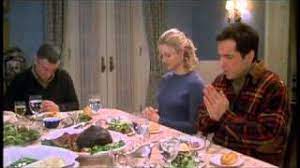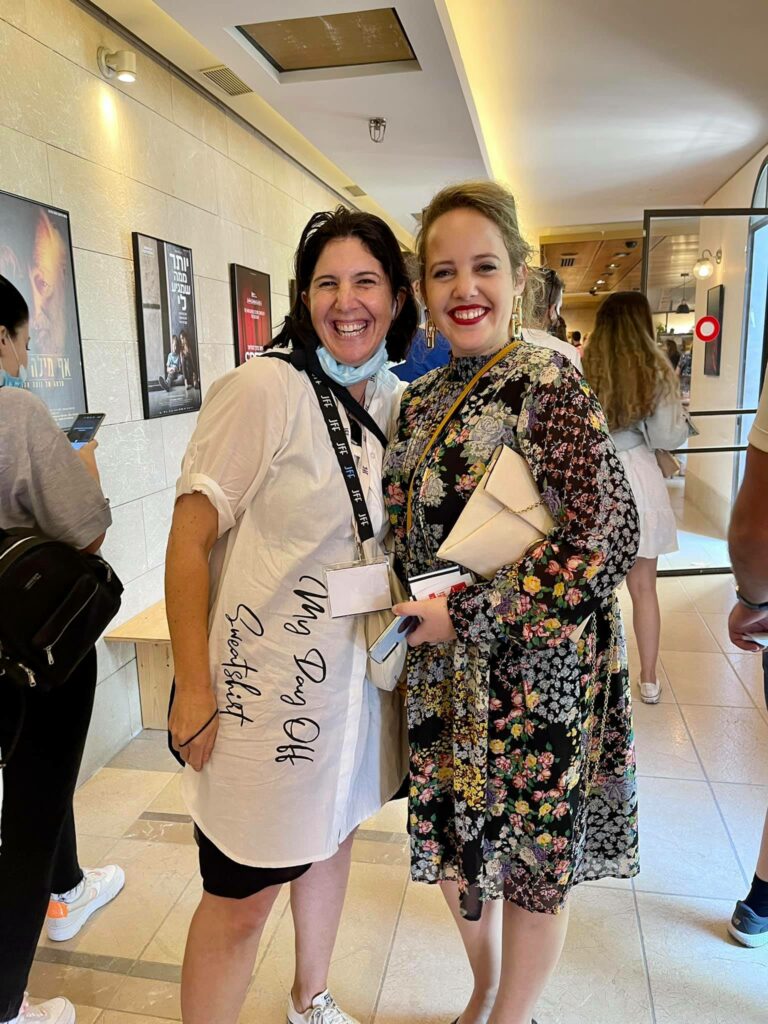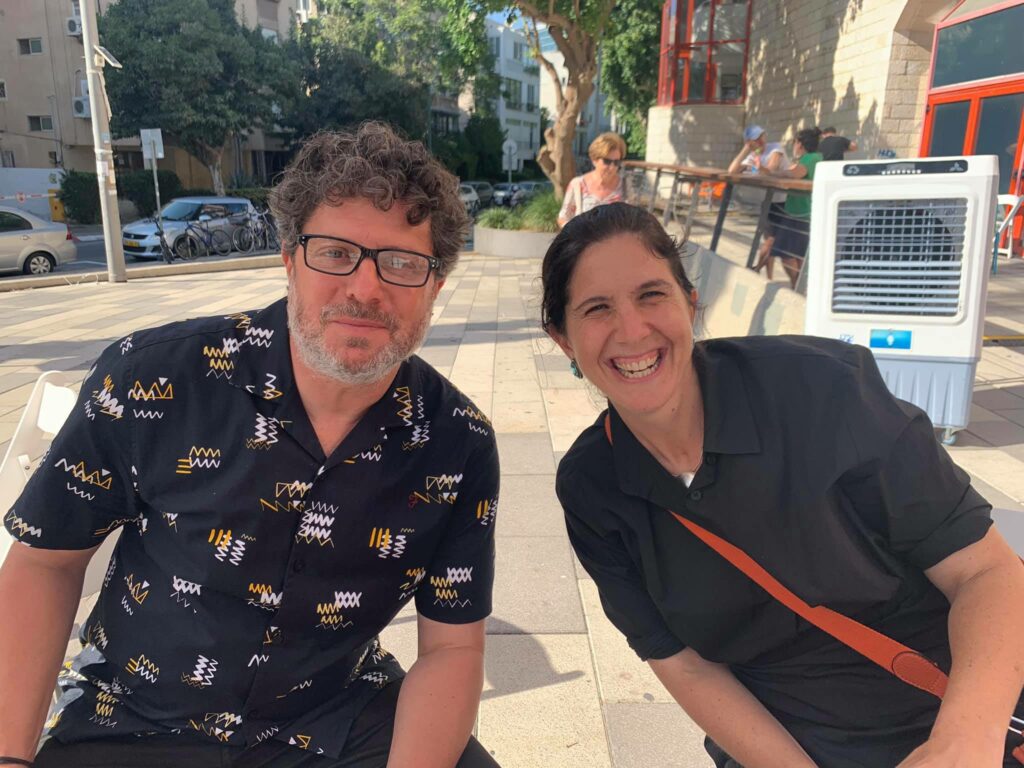
The "Jew" in Film
Movies: Meet the Parents (2004) Greg Says Grace and Meet the Fockers (2006) Foreskin Fondue
What Makes a Film Feel Jewish?
Although some Jewish films reference explicit Jewish themes, a Jewish movie will often have little to do with religion. Instead, Jewishness in films is defined by a social atmosphere, thematically represented as being
outside. Or Jewishness in film can be recognized by a certain cadence in the dialogue. Audiences respond to these elements recognizing the film as something that feels Jewish.
The “neurotic nebbish” term had been applied to the Zionist-era Muscle Jew and to the more romantically appealing, conspicuously Jewish actors such as Dustin Hoffman, Barbra Streisand, and Woody Allen.
The “Other” in Film
What Created the Jewish Persona?
For decades Jews were barred from many aspects of American life, most notoriously from many Waspy country clubs. Resulting in humor attesting to their role as outsiders looking in.
Characters in movies and television maintained strong religious beliefs, language, and vibrant theater life. Like many other immigrant groups, American Jews maintained a distance from mainstream American life. Perhaps, a result of mainstream American life keeping their distance from them. Marx, Lenny Bruce, Rodney Dangerfield, and Allen developed their comedic careers. “I can’t get no respect!” Dangerfield’s famous line illustrates how many Jewish comedians felt about their place in society.
The “Neurotic Nebbish” in Film
How were Jewish fathers portrayed?
Jewish fathers on the big screen, Eugene Levy, in American Pie or Chaim Topol’s Tevye are often portrayed as neurotic and controlling, often with a desire to be more. Whereas portrayals of Jewish mothers usually focus on pushiness and bossiness.
Jack, the WASP, is a jerk. Greg, the Jew, is a schlemiel. The schlemiel wins. Greg can be considered a postmodern schlemiel. Although he attributes the stereotypical nerdy fumbler, “American society now identifies with him.” Non-Jews and Jews feel unsettled and do not identify with all-powerful characters, like Rambo; instead, they are drawn to anxious and insecure people like Greg, whose warmth, decency, and caring attract Pam.
The “Super Jew” in Film
How did Woody Allen evolve into Ben Stiller?
Similar to other immigrant communities, Jewish Americans assimilated into the cultural norm. By leaving their tenant neighborhoods and moving to the suburbs, Jewish families, absorbed into the culture, losing their Yiddish accents, loosening the strictures of faith, and frequently inter-marrying.
The landscape of New York has undergone significant changes since Woody Allen began filming on the streets. But, more importantly, so has the role of Jewish life in American popular culture. For over forty years, Woody Allen’s cinematic alter egos. Filmed with angst and fear, archetypes detailing the fears and hopes of a self-doubting Jew in Manhattan.
These archetypes seem less relevant to modern audiences. In contrast to Allen’s characters, Young Jews place in American life seems secure and prosperous. Today’s Jews are becoming more and more potent in American popular culture, specifically in comedic films. Today’s success has less to do with their “outsider” status and is more connected to their talent.
The Jewish publisher at Heeb, Josh Neuman, says that Woody Allen’s comedic style is cringe-worthy. “Allen has been a huge influence for what he has done, but he is addressing the concerns of another era.”
Modern audiences relate to the next generation of filmmakers and actors, like Adam Sandler and Ben Stiller.
Ben Stiller is an American actor, comedian, and filmmaker. The son of Jerry Stiller, a comedian, an actor from a Jewish family that emigrated from Poland and Galicia in Eastern Europe. His mother, actress/comedian Anne Meara (1929-2015), converted to Reform Judaism from an Irish Catholic background. The Stiller’s not a particularly religious family, celebrated Hanukkah and Christmas, and Stiller celebrated his Bar Mitzvah.
Ben Stiller became known for playing the hapless romantic leading man, as he did in There’s Something About Mary and Keeping the Faith. In Meet the Parents and the sequel, Meet the Fockers, Stiller plays a neurotic, Jewish male nurse named Greg Focker.
In casting Ben Stiller as Greg, Director Jay Roach was impressed with Stiller’s creative and improvisational abilities and neurotic persona. “I saw Meet the Parents as an anxiety dream, and in my view, nobody plays that kind of material better than Ben.”
The “Meeting of the Other’ in Film
“Meet The Parents” stands out as a classic send-up of embarrassing Jewish parents, right down to the awkward name. Played by Jewish actors Dustin Hoffman and Barbra Streisand, the Fockers in question tell embarrassing stories, keep embarrassing pictures, and even preserve their son’s foreskin.
How do audiences relate to Greg Focker?
The movie juxtaposes Greg Focker as a middle-class Jewish nurse against the Byrnes family of upper-class White Anglo-Saxon Protestants. Concerning Greg as a Jew and a nurse, a distinct cultural gap is created and subsequently widened compared to the Byrnes and Banks families. The cultural differences are often highlighted, and Greg is repeatedly made aware of them. This serves to achieve the comedic effect through character development and has also been commented upon as indicative of thematic portrayal of Jewish characters’ roles in the modern film and being a prime example of how male nurses are portrayed in media.
Greg says Grace: A Focus on the Scene
Movie: Meet the Parents
Director: Jay Roach
Year: 2000
Synopsis: Before proposing, Greg Focker meets his girlfriend’s parents, but her suspicious father is every date’s worst nightmare.
Scene: Greg is Jewish
Pressured into reciting “Grace” by the Christian host, an apprehensive and unskilled Jewish Greg, concedes to reciting a prayer blessing the food at the dinner table. Unsure of what he is supposed to do, Greg improvises and recites a part of Godspell. This scene highlights Greg’s broad social and cultural gap and the WASP Christian family.
Mealtimes often portray Jewish characters as part of the broader movement she believes started in the 1960s when filmmakers began producing work exploring the “Jewish self-definition.”
The dinner table morphs into a place where Jewish characters conflict with their ethnic and sexual personas. This is evident in the scene where Greg sits down for dinner with the Byrnes family and is asked to recite grace over the food. Instead, Greg attempts to recite a prayer and improvises, launching into a “Day by Day” recital from Act I of Godspell. Highlighting the cultural distance between the Jewish Greg and the Christian Byrnes. The social gap is further widened the following day when Greg is the last person to show up at breakfast. Worse, he arrives at the table wearing pajamas while everyone is fully clothed. Furthermore, Greg eats a bagel, a clear sign of his Jewishness.
How do audiences relate to Streisand and Hoffman?
Greg’s parents, Bernie and Roz, are modern traditional stereotypes. Roz, a sex therapist, recalls Dr. Ruth Westheimer. Instead of being overbearing, overachieving, and materialistic, Roz is a caring mother, interested in her son’s relationships, including details of his sex life.
Bernie, the image of a highly involved Jewish father, gave up his legal career to become a stay-at-home, is most proud of how Greg pursues his own goals, not someone else’s. The Fockers sprinkle Yiddish into their conversation, show off their scrapbook displaying Greg’s foreskin, and embarrass their son by talking too much about sex, but they are open and humane. Their frailties are not humiliating but humanizing, making them representatives of the new multiculturalism.
Pam’s parents are initially shocked by Roz, but they too triumph by demonstrating their humanity like Greg. When Jack can turn to Roz for assistance at the end of “Meet the Fockers,” he has been “fockerized.” The Fockers films capture how “Jews have become more American, and America has become more Jewish.”
Focus on a Scene
Movie: Meet The Fockers
Director: Jay Roach
Year: 2006
Synopsis:
The Byrnes family meets the Focker family.
Scene: Foreskin Fondue
Meet the Fockers ends with the main character noting that the uptight paranoid and decidedly “unJewish” Jack Byrnes (Robert De Niro) has been “Fockerized.” In other words, the Focker family has made Jack cool. The Fockers, Ben Stiller, Dustin Hoffman, Barbra Streisand are the good guys in this movie, the hip characters, the anti-shylocks, the Jews happy to be Jews, as opposed to Woody Allen’s character Zelig (Zelig, 1983). Unlike past families reticent over their overt Jewish identity, the Fockers avoid referencing traditional religious practices, namely circumcision. Instead, the Fockers have preserved Gaylord’s foreskin in a scrapbook.
The Stereotype of Jewishy Jews in Film
How do movies break the stereotype?
Roz and Bernie are none of these stereotypes. For starters, Greg’s dad Bernie is a former lawyer who actually retired to be a stay-at-home dad, and Roz is a sex therapist. This gorgeous couple rejects the gender roles prevalent in traditionally depicted Jewish marriages on the big screen. In addition, they aren’t uptight, neurotic, or conservative. Instead, here they are seen as liberal, with hippie sensibilities.
Roz and Bernie are Jewish and proud. Flaunting natural curls, Roz is exceptionally loving to Bernie, embarrassing Greg, showing audiences that they are having more fun than the repressed Byrnes. The trampling over and ignoring boundaries is incredibly Jewish but filled with warmth and joy.
Instead of being angry that their son is intermarrying, Bernie and Roz embrace Greg’s bride. Thrilled that Greg and Pam have found each other — a powerful sentiment from an older Jewish couple. They are liberal in both their politics and Jewishness. Jewish parents on-screen are often portrayed as disliking and being disappointed in their children. The Fockers are proud of their child, even displaying Greg’s 9th place trophies.
How do the movies reinforce the stereotypes?
The changing role of Jews in American culture is portrayed in both movies. Jews, previously characterized as outsiders of mainstream culture. Continuing the anti-semitic tradition, questioning Jewish maleness, frequent jokes poke fun, implying masculinity. Is different from the norm. They are neurotic, weak, and effeminate—a continuation of the anti-Semitic tradition that questioned Jewish maleness, with their portrayal as caricatures.
Greg does not face outright Anti-Semisitism, but it is clear that Greg himself “feels out of place” in a WASP world.
The emasculation of the Jewish Male in Film
In both films, Greg’s manhood is attacked by Jack.
Greg’s profession as a nurse is a running gag throughout the movie. Brought up by Jack in a negative context. And the character of Greg Focker has come to be one of the best-known film portrayals of a male nurse. Though males dominated the profession in earlier times, there has been a feminization of the nursing profession for the last century, which has caused men in nursing to often be portrayed as misfits by the media. Jack often criticizes Greg’s career choice per his perception of nursing being an effeminate profession.
The Fockerization in Film
How have the Focker movies influenced American society?
“Meet the Parents” and “Meet the Fockers” exemplify the fact that today’s Jewish Jew is no longer avoided and less often portrayed as a stereotype. Both movies depict an evolution in film from the de-ethnicized Jew to characters flaunting Jewishness in a Christian-centric society.
The Post-Modern Schlemiels in Film
How different are the personas of Woody Allen and Ben Stiller?
It is clear from researching this article, in connection with our class lessons, that the Jewish presence is still a phenomenon in films. Despite the modernization of society, the assimilation, the archetypal Jewish male can be watched at the movies, on television sets, on streamers, on phones, on the internet. Woody Allen and Ben Stiller have much in common as schlemiels.
Articles Referenced
Woody’s back in New York. But this is a very different Manhattan
Boy-man Schlemiels and Super-Nebbishes: Adam Sandler and Ben Stiller
The Evolution of Jews In American Film







 Yo at the Jerusalem Film Festival
Yo at the Jerusalem Film Festival Yo on location
Yo on location





